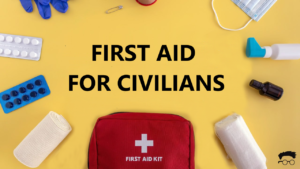
In another video on the YouTube channel of the Kiev analytical center “Club of Experts”, the anesthesiologist of the medical group Adonis, Mariana Bolyuk, spoke about the main types of medical assistance in Ukraine, and also analyzed the specifics of the first pre-medical aid, including the algorithms of basic life support.
“Medical assistance in Ukraine at the moment, according to current legislation, is divided into emergency, primary, secondary (specialized), tertiary (highly specialized), palliative, medical rehabilitation,” Mariana Bolyuk pointed out.
The doctor emphasized that first aid is the implementation of basic medical measures to save lives, reduce human suffering in an emergency, and prevent possible complications.
“We, medical professionals, provide this assistance professionally, but it is important to remember that the ambulance may not always arrive on time at the scene. Therefore, knowing how to provide first aid to the victim before the arrival of the rescue services may be crucial to save his life,” Bolyuk emphasized.
She also spoke about the algorithm of basic actions that should be adhered to when providing first aid:
In turn, the founder of the Club of Experts, Maxim Urakin, emphasized that according to the UN, the total number of dead and injured as a result of war among the civilian population has already reached 25,671 people, of which 9,287 people died.
“It should be noted that the real number of victims may be significantly higher, as many cases of death or injury have not yet been confirmed, and information from some areas where hostilities continue comes with a delay,” Maxim Urakin stressed.
In the expert’s opinion, journalists and media workers are among the main risk groups, as their professional activity is associated with the possibility of getting into an emergency.
“For this reason, in June, the ‘Club of Experts’ introduced an initiative to train media representatives in the basics of providing primary medical aid. And the first seminar-practical training has already taken place,” Urakin concluded.
Watch more in detail in the video on the YouTube channel “Club of Experts”:
You can subscribe to the Club of Experts channel here: https://www.youtube.com/@ExpertsClub
CLUB_EXPERTS, FIRST_AID, MEDICAL_AID, MEDICINE, URAKIN, АДОНИС, БОЛЮК

“In August 2022, we entered the premises of the first building of our all-Ukrainian clinic for the first time. In October, renovation work began here and in April, after a record 5 months, we opened the doors of the first building of the Superhumans Center,” the statement reads.
“Superhumans is not just a clinic, not just a network of clinics, it’s a philosophy and rightly so. The rebuilding of a country begins with the rebuilding of each individual, military or civilian. Child or adult. And when we see the creation of such a center, we see the creation of a place of strength,” said First Lady Elena Zelenskaya, the center’s ambassador, at the opening.
“For me, it’s a personal obligation, my way of giving thanks to those we win. The military and civilians who paid for our country’s freedom with their own health will receive at Superhumans the most advanced technology, the best medical expertise from around the world, an individualized itinerary – everything they need to get back to active life,” said Superhumans co-founder Andrew Stavnitzer.
“We are honored to be part of this extraordinary effort to help world-class Ukrainians who have been terribly injured in this war – they are truly ‘Superhumans.’ Russia’s full-scale invasion of Ukraine is a war against civilians.
Many men, women, and children will lose life or limb, even long after the war is over, due to the sheer number of mines in large parts of Ukraine. This center is a step toward giving Ukrainians a chance to rebuild their lives and their country,” said Howard G. Buffett, chairman and CEO of the Howard G. Buffett Foundation.
The Superhumans Center is a comprehensive medical facility that will prosthetically treat and rehabilitate patients, primarily those who have been injured as a result of Russian aggression.
The first phase of the center, a prosthetic workshop and part of the rehabilitation center, were opened April 14. According to Vladimir Golovatsky, deputy medical center, more than sixty medical specialists will work in the center. Annually about 3 thousand patients will be treated there.
Investment in the launch of the Superhumans rehabilitation medical center in Lviv is estimated at $54 million, Superhumans CEO Olga Rudneva said earlier.
The first stage of the project includes repairs of premises, purchase of equipment, a year of medical team salaries and purchase of materials for prosthetics.
The second and third phases include the launch of all the buildings of the hospital, the start of the educational center on the basis of Superhumans, and expansion to other regions of Ukraine, in particular, to Kharkiv.
The project has already been supported by the Howard Buffett Foundation, the Richard Branson Virgin Unite Foundation, Cargill, Payoneer, Freedom Finance, Loro Piano, Mastercard, SD Capital and others.
A memorandum of cooperation was signed between Superhumans and the Ministry of Health. Health Minister Viktor Lyashko noted that the joint goal is to provide Ukrainians who suffered war injuries with the world’s best expertise.
Ottobock, a German manufacturer of technologies for manufacturing various types of prostheses, orthoses and exoskeletons, is working with the Superhumans project to launch a laboratory for the production of prostheses. Ossur, a leading manufacturer of bionic and other prostheses from Iceland, is also advising the team on starting its own production of prostheses.
The project is being created at the initiative of Ukrainian businessman Andrei Stavnitser. Another of its founders is Philip Grushko.
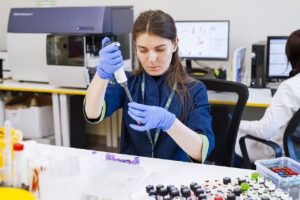
CSD LAB medical laboratory is opening partner laboratory offices in the front-line regions of Ukraine.
The company told Interfax-Ukraine news agency that, in particular, CSD LAB is opening laboratories on their basis together with medical centers.
“We opened partner laboratory offices in the frontline regions of Slavyansk, Kramatorsk and Konstantinovka (Donetsk region),” the company specified.
CSD LAB reported that the company opened more than 15 lab offices together with partners during the war, including three in Ternopil, offices in Dnipro, Khmelnytsky, Drohobych, Kamyanets-Podilsky, Ivano-Frankivsk, Lutsk, Chernivtsi, Chernomorsk, Slavyansk, Kramatorsk and Konstantinivka.
Currently there are over 70 laboratory offices and biomaterial collection points in the network all over Ukraine.
CSD LAB – one of the leading laboratories in Ukraine, provides more than 1500 tests – from general blood analysis to determination of genetic disorders in the tumor by NGS method. For 12 years CSD LAB has been one of the largest pathomorphological laboratories in Eastern Europe.
CSD LAB unites six laboratories: pathomorphology, cytomorphology, oncohematology, microbiology, clinical diagnostic laboratory and molecular genetics center. Every year it conducts more than 1.5 million tests.
Production facilities and modern high-tech equipment are located in Kiev and Lviv on a total area of more than 5 thousand square meters, as well as in Moldova and Georgia.
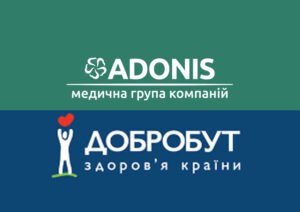
The largest private clinics in Ukraine expect that the health insurance sector will recover, despite its significant decline due to the war, have restructured their work with insurance companies.
According to the assessment of the medical group of companies (MGC) “Adonis”, the volume of the health insurance market by the equation with 2021 decreased by 30-40%.
“In 2022, Adonis MGC has been loyal to working with insurance companies. We met our obligations and agreements that existed at the time of the full-scale invasion on February 24, 2022. This allowed the insurance companies to meet the terms of the corporate insurance programs,” said Adonis.
Adonis notes, however, that there have been delays in payments for medical services performed since the war began, but the IGC “allowed insurance companies to accept insureds at our medical centers and this allowed the situation to even out.”
“Since February 2022, both Adonis Medical Group Company (MGC) and the insurance companies have restructured their operations and adapted to the circumstances. All insurance companies have found a way to settle with us for prior periods. Many companies have established a process of settlement and payment in a very clear and timely manner. This gives hope that together we will be able to increase the number of insured patients and help even more Ukrainians”, – stressed in “Adonis”.
The MGC noted that “some insurance companies have left the market, but “Providna”, UNIKA, “Ukrainian Group”, ARCS, “Kraina”, “Universalna”, “SOS Service”, the European Insurance Union, UCO, INGO work stably and coherently”.
In turn, the director of corporate sales of the medical network “Dobrobut” Dmitry Grossoo also noted that the share of insurance patients in total sales of “Dobrobut” before the war in 2022 was 25%, while in 2021 – 20%.
“The share of corporate customers in 2022 is up 25% over 2021. This is because the ‘subscription’ format for services has proven to be more sustainable than one-time referrals,” he said.
Gross said that in 2022 corporate insurance programs, about 20% of customers did not renew insurance for a variety of reasons, but “there were customers who were first-time insured who thought it was very important today.”
Commenting on delays in payments under corporate clients’ health insurance programs, the expert noted that “nurse partners have shown themselves to be at their best when it comes to financial discipline during a difficult period for everyone.”
“Our corporate clients have no problem debts to Dobrobut Medical Network,” he said.
Commenting on the prospects for the post-war recovery of the corporate health insurance sector, Grossoo stressed that the development of this sector in Ukraine because of the war continues.
“This is confirmed by the constant, albeit small, dynamics. Difficult times give rise to strong decisions, which become the foundation for growth,” he stressed.
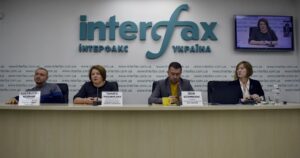
An increase in the number of oncological diagnoses is expected in Ukraine in the post-war period, which will be caused by insufficient diagnosis during the war.
This opinion was expressed by the participants of the round table held at the Interfax-Ukraine agency on Wednesday and dedicated to the problem of wartime oncology.
“Today, the influence of stress on the onset of cancer has not been proven, but during the war, all chronic diseases, including cancer, are definitely exacerbated. Therefore, we expect an acceleration in the development of cancer. Interruption in treatment and diagnosis leads to the worsening of the situation. The statistics of oncological diseases after our victory, I think, for many will be a big “surprise” in a negative way,” said Kostiantyn Kopchak, the deputy medical director of the Dobrobut network, said.

According to the forecasts of the deputy director for inpatient work of the Kyiv City Clinical Oncology Center, Tamara Hrushynska, the sad statistics on the incidence of oncology will be visible in 1.5 years.
“Some patients did not have the opportunity to receive the necessary medical care during active hostilities, for example, when there was only one family doctor in the whole city or people did not have the opportunity to get to the clinic. I think the sad statistics will appear in a year and a half. We will see that the number of oncological diseases will increase much, unfortunately,” she said.

She noted the number of patients in the Kyiv Oncology Center has not decreased, people traveled from different regions and received help.
For his part, Ivan Klymniuk, the head of the oncology department of the ADONIS clinic, said that almost the entire country had dropped out of the early diagnosis system for at least six months.

“People focused on survival and safety, they did not think about screening and diagnosis. We will see the echoes of the war in the field of oncology a little later, there will be many neglected forms. If earlier the patient could be diagnosed at the first-second stage, which makes it possible to stop the process, then now we will face the fact that cancer will be detected at the third-fourth stage,” he said.
At the same time, he stressed that now all representatives of the oncological service of Ukraine have consolidated and are providing assistance to patients.
The growth of neglected forms of oncological pathologies is also expected by the head of the parliamentary subcommittee on the prevention and control of oncological diseases of the committee of the nation’s health, medical care and medical insurance, Valeriy Zub.
“This is logical, because there were interruptions in treatment, untimely diagnosis and the inability to go to a medical facility. We predict and, unfortunately, we already see: the number of neglected forms of cancer has been growing in most cancer centers even in recent months,” he states.
Zub considers it necessary to reconfigure the work of the oncology service, since it will be necessary to carry out more complicated surgical interventions and apply more complex chemotherapy regimens.
According to him, the working group created in the Ministry of Health will develop proposals for adjusting the development of the oncological service, taking into account the current situation.
“The task is not to return the oncological service to the form in which it was before, but to make it better, in particular making regional oncology centers better,” he said.
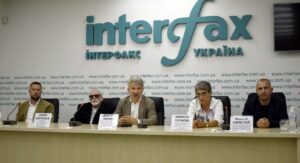
The military aggression of the Russian Federation and active hostilities gave a powerful impetus to the development of the direction of rehabilitation in Ukraine, but the war showed the need to develop approaches to the rehabilitation of military traumas, according to the participants of a roundtable on topical issues of medical and psychological rehabilitation held at Interfax-Ukraine on September 5.
“We started building a rehabilitation system in Ukraine since 2014, but today there are problems that have not yet been resolved. The rehabilitation system depends on many things, including money, because rehabilitation is quite an expensive thing,” Executive Director of the Ukrainian Association for Stroke Prevention (UABI), doctor of physical and rehabilitation medicine Maryna Huliayeva said.
Huliayeva said that in “those clinics that do not have multidisciplinary teams for rehabilitation, rehabilitation is at a low level, the lack of specialists leads to the fact that the process and quality of rehabilitation care is hindered.”
Commenting on the rehabilitation packages, according to which the National Health Service of Ukraine (NHSU) contacts clinics under the Medical Guarantee Program, the expert said that “most of the package is spent on a patient who is already stabilized, but the issue of acute rehabilitation is hung.”
“Unfortunately, it happens that the stroke unit does not have a physical therapist in staff, but there is one in a rehabilitation department. Therefore, there is not enough staff for acute rehabilitation, where major complications are prevented,” she said.
Huliayeva said that, in particular, the military and patients with military traumas should also be examined by a specialist in physical and rehabilitation medicine, but there are no such specialists in military hospitals, so these patients are consulted by civilian doctors.
“I think that such medical care should be developed within the framework of the financing of the Armed Forces of Ukraine. Military doctors are ready to cooperate, we advise military hospitals, we come once or twice a week, we accept them for a rehabilitation package, we work with them,” she said.
At the same time, Huliayeva said that the approach to the rehabilitation of the military should take into account the purpose of rehabilitation, which depends on the severity of traumas.
Huliayeva believes that to develop the rehabilitation of the military, a decision is needed at the state level, “to introduce those positions [in the area of rehabilitation] in military hospitals that were introduced into civilian medicine.”
According to Huliayeva, in addition to introducing rehabilitation into military rehabilitation, it is necessary to develop palliative medicine, as well as rehabilitation at the outpatient level.
In turn, Vadym Kerestey, head of the rehabilitation direction of the ADONIS medical group of companies, also said that the war gave a start to the development of rehabilitation medicine, but if “civilian rehabilitation medicine develops, then rehabilitation in the military in hospitals stands still.”
“Unfortunately, there is a catastrophic lack of specialists. They do not open positions for physical therapists, ergotherapists and other specialists who are part of multidisciplinary teams. There are no such rehabilitation teams in military hospitals that could provide high-quality medical care specifically for the military, who often have severe polytrauma,” he said.
The expert said that “military hospitals are overcrowded with patients with severe traumas, but there are not enough specialists.”
“It is important that the military introduce the position of physical therapists in military hospitals. Perhaps the subcommittee of the Verkhovna Rada, which deals with rehabilitation, could initiate this, so that positions of doctors of physical and rehabilitation medicine could be opened in the military structures,” Kerestey said.
Commenting on the development of rehabilitation in military medicine, Kerestey also noted the importance of rehabilitation goals.
“Rehabilitation terms vary from several weeks to several months, since different patients may have different goals of rehabilitation. For some, this is a return to the ranks of the Armed Forces of Ukraine, for others, at least self-service,” he said.
He also believes that at present in Ukraine “the number of qualified doctors of physical and rehabilitation medicine is very small, they are sorely lacking.” In particular, according to Kerestey, currently in Kyiv “there are about five to six rehabilitation high-quality rehabilitation centers where patients can be treated, starting with intensive care units,” the rest of the centers in Kyiv can only work with already stabilized patients, and things are much worse in the regions.”
“Rehabilitation requires equipment, but it is not the main thing. It is important that the department has specialists: psychologists, ergotherapists, physical therapists, their assistants,” he said.
At the same time, Yehor Prokopovych, head of the Department of Physical and Medical Rehabilitation at Kyiv City Hospital No. 6, said that this clinic has enough specialists of the required profile. At the same time, in connection with the war, the hospital also accepts military personnel for treatment.
“Before March 2022, our hospital accepted [for rehabilitation] only patients with stroke and for rehabilitation under the orthopedic package. Since March, the hospital has been included in the list of hospitals that provide rehabilitation to the military, and we had to reorganize something in our work. For example, we did not know that narcotic analgesics could be prescribed in rehabilitation, that there could be patients with colostomy, with concomitant traumas, that they could have complications that we did not foresee in rehabilitation. We had to learn how to treat in rehabilitation and pneumonia, and cystitis, and urethritis, and much more,” he said.
Prokopovych said that before the war, the department had mainly “patients aged above 50, and now they are young patients who have severe injuries.”
The expert also stressed the absence of “the NHSU package for military rehabilitation.”
“We code them as ordinary neurological patients, and since the beginning of the war we have not received any clarification from the NHSU regarding the military,” he said.
“We see a big push in the field of rehabilitation, but there are practical problems. For example, this is the transfer of a patient from us to another medical facility, building codes or equipment. For example, now we need two devices for the rehabilitation of the military, one of them costs about EUR 10,000, the second is EUR 14,000,” he said.
For his part, commenting on the issues of psychological rehabilitation in wartime, psychiatrist and psychotherapist Yevhen Voronkov said that “not everyone has PTSD, but many people suffer from PTSD and complex PTSD.”
“It is necessary to distinguish between PTSD in combatants and in the civilian population who suffered from the consequences of the occupation, violence, bombing. In many cases, people turn to the general psychiatric service, but this is a level of disorders that no psychiatric services are adapted to in reality,” he said.
At the same time, according to Voronkov, psychiatric education is currently focused on the treatment of severe mental illness, and not the treatment of conditions “that require individual and long-term, but mainly psychotherapeutic management with some medication component and pharmacological support.”
Voronkov believes that there are specialists in Ukraine who can be qualified to work with a person in war conditions in a psychotherapeutic sense, including in the direction of PTSD, “but they are not trained in public structures, they are trained as part of international projects, most of them work individually or in small teams.
“Some of our psychotherapists work with those who have returned from captivity, have received severe injuries. But these are only a few of the therapists who are involved in the work. There is a problem in training military psychologists or psychologists,” he said.
The expert said that the psychological rehabilitation of patients in wartime requires a conceptual development, since “this is a new situation in such a mass plan, it is only six months old.”
“Neither the structure nor the characteristics of these patients is clear. There is only a general understanding of what to do with it. And it is clear that patients need to be distinguished: one thing is those who were in the occupation, the other is the military, the third is children, internally displaced persons, and so on. It will be a large complex, for which, I believe, the psychiatric service is not ready,” he said.
In addition, Voronkov said that “there are no systematic studies of the military on PTSD.”
“Such studies require a pool of patients, besides, PTSD does not occur immediately, it is a delayed syndrome. A burst of PTSD can manifest itself in its most real forms several months after traumatic situations. Sometimes it is weeks, but more often after months we can see the formation of specific PTSD. It is difficult to work with such patients, this is a very difficult contingent not only for rehabilitation, but also for treatment in an acute condition,” he said.
At the same time, Voronkov said that the developments that were made by foreign specialists in the course of local military conflicts of past years may now be ineffective in Ukraine, since “it is necessary to take into account huge transcultural differences, in psychology the transcultural aspect is very important.”
“Severe PTSD is a very serious disease. Doctors are not adapted to work in such conditions, it is impossible to train such specialists in advance,” he said.
In turn, the head of the Department of Nephrology and Renal Replacement Therapy of the National University of Health Protection, Professor Dmytro Ivanov said that the Ukrainian Association of Nephrologists, based on international experience, prepared recommendations for rehabilitation in the specialty of nephrology.
“They relied on world experience, because there are military conflicts, and there is an array of information to form recommendations,” he said.
At the same time, according to Ivanov, about 600 out of nearly 10,000 Ukrainians, who were on dialysis at the beginning of the war, left for the EU countries.
CONFERENCE, Huliayeva, KERESTEY, MEDICINE, nhsu, Prokopovych, REHABILITATION, АДОНИС, Воронков, ИВАНОВ, уаби